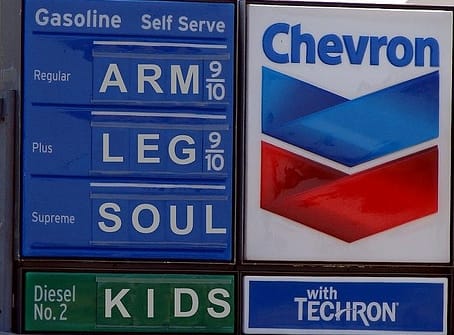Prices at the Pump: Drilling in America


Little commentary is needed on the uncomfortably high prices we’ve been paying at the pump the past several weeks. When it comes to filling up, anything above $4 a gallon seems rather indulgent. So what factors have contributed to this current spike in gas prices?
According to AAA Oil Price Information Service, the price of retail gasoline has risen to an average $3.842 per gallon in the U.S. This is a record high for this time of year, with gas prices rising by nearly 57 cents per gallon since the start of 2012. The highest gas prices are currently in California with an average of $4.33 per gallon. For a list of average prices for each state click here.
With summer a few months away, the demand for gasoline increases. This will typically cause prices to rise about 20 cents per gallon. Analysts claim that gas prices could rise another 50 cents per gallon if the impasse over Iranian nuclear ambitions escalates into some sort of military conflict. Diplomatic and economic tensions, causing the U.S. ban on Iranian oil, have the potential of imposing huge impacts on the economic recovery in this country.
None of this is good news during an election year, where the GOP conveniently points to current gas prices as a reflection of President Obama’s apparent ineffectiveness. Rising gas prices are driving down the President’s approval rating, and this issue is proving to become a major challenge for his re-election.
Republican presidential hopefuls see domestic drilling as a quick fix to the problem of high gas prices. For a country that boasts of 2% of the world’s oil reserves, and yet consumes 20% of the world’s oil supply, this has obviously brought about much criticism. With 21 billion barrels of proven oil left in U.S. reserves, we have approx. 7 years’ worth of oil remaining if current consumption rates stay consistent.
The Obama administration, not to be hampered by questions of the viability of U.S. oil reserves, has ramped up domestic drilling to unprecedented levels. In 2011, domestic drilling of oil was up to 10.3 million barrels a day, its highest level in nearly 30 years. Oil rig numbers in the U.S. have quadrupled, and the Obama administration has approved oil exploration in Arctic waters off Alaska.
Despite all this domestic drilling however, a decrease in prices seems to be ever out of reach. In response to the current expansion in U.S. drilling, Mike Lynch of Strategic Energy and Economic Research, Inc. states, "It's not going to change the price of oil overnight, and it's probably not going to have a huge impact on the price of oil ever."
The only thing that remains certain here is that politicians will continue to place blame, and reach for quick fix solutions to current gas prices in order to gain votes. Gas prices will be a key factor in the 2012 elections.http://www.youtube.com/watch?v=c7o--wFAlTQ=en_US&start=0802


